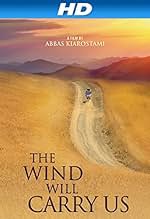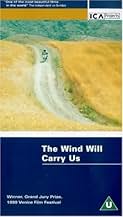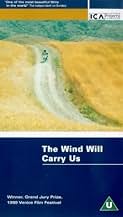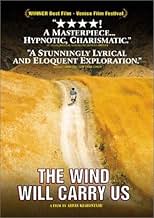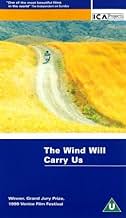Der respektlose Stadt-Ingenieur Behzad fährt in ein ländliches iranisches Dorf, um am Bett eines sterbenden Verwandten zu wachen. In der Zwischenzeit folgt der Film seinen Bemühungen, sich i... Alles lesenDer respektlose Stadt-Ingenieur Behzad fährt in ein ländliches iranisches Dorf, um am Bett eines sterbenden Verwandten zu wachen. In der Zwischenzeit folgt der Film seinen Bemühungen, sich in die lokale Gemeinschaft einzufügen, und untersucht, wie sich daraufhin seine eigene Eins... Alles lesenDer respektlose Stadt-Ingenieur Behzad fährt in ein ländliches iranisches Dorf, um am Bett eines sterbenden Verwandten zu wachen. In der Zwischenzeit folgt der Film seinen Bemühungen, sich in die lokale Gemeinschaft einzufügen, und untersucht, wie sich daraufhin seine eigene Einstellung ändert.
- Regie
- Drehbuch
- Hauptbesetzung
- Auszeichnungen
- 4 Gewinne & 7 Nominierungen insgesamt
Empfohlene Bewertungen
[Stanza 1] In my small night, alas, The wind has an appointment with the trees, In my small night there is fear of devastation.
[Stanza 2] Listen. Do you hear the dark wind whispering? I look upon this bliss with alien eyes I am addicted to my sorrow Listen. Do you hear the dark wind whispering?
[Stanza 3] Now something is happening in the night The moon is red and agitated And the roof may cave in at any moment.
[Stanza 4] The clouds have gathered like a bunch of mourners And seem to be waiting for the moment of rain.
[Stanza 5] A moment And after it, nothing. Beyond this window the night trembles And the earth Will no longer turn. Beyond this window an enigma worries for you and for me.
[Stanza 6] Oh you who are so verdant Place your hands like a burning memory in my hands. And leave your lips that are warm with life To the loving caresses of my lips. The wind will carry us away, The wind will carry us away.
Enjoy it with an open and rested mind. The style is minimalist for action and words, and panoramic for scenery. It's an artful exploration of life where the viewer has to glue the pieces together, from city group's arrival and to their take-away from the experience. Details count. Don't miss any of them.
Throughout the picture, the perpetually befuddled engineer drives up to the breezy incline to receive cell phone calls that don't come through clearly in the village below. Do the calls concern an old woman who's dying? A search for buried treasure? The exhumation of dead bodies? We never hear the other end of the conversations, so we never find out.
The modern hero's jeep and cell-phone dominated life seems empty of purpose, other than the impulses and sensory input of the moment. The lives of the traditional villagers don't seem any more meaningful. Kiarostami's picture is no ethnographic celebration of simple-hearted, but wise peasants with a profound culture.
The movie is like Samuel Becket's definitive theatre of the absurd, "Waiting for Godot." But while the depressed Irish playwright's characters wander around in a desolate landscape, Kiarostami's engineer is placed in a spacious, richly colored world that yields tantalizing, paradoxical hints of meaning, despite the random, aimless movements of the human beings who inhabit it.
Perhaps we're seeing this story from the wind's point-of-view.
Three men journey from Tehran to a tiny remote village for purposes unknown. Contrasts evolve between their urban modernity and the ageless life of the rural village. They're ostensibly there for the funeral of an ancient woman, a stranger, not a relative, who confounds their expectations by not dying. Let's just say, for the sake preserving the mystery, that they're there, in a way, to cheat death, to rob the villagers of a ritual they themselves fail to understand.
By way of first person narration, the film centers on their leader (Behzad Dourani), a man who accepts being called "engineer," but really isn't--or is he? The perspective is doubled: The world of the film narrowly revolves around him at the same time that it doesn't, claustrophobically relating everything to his solitary universe, at the same time that it encompasses the full scope of a world independent of him, thus giving the lie to his limitations, his distortions and blindness. This is narrative executed with great skill, care, and a free imagination.
Forced to wait, idle and deprived of most of his customary modern distractions, his anxiety, emptiness, and his unease surface; this is a man out of time, who resists the present and fights against the future. His one connection to the outside world, a cell phone, requires every time it goes off that he drop whatever he's doing to run to his truck and drive up to a mountain-top cemetery for clear reception, an association of technology with death concurrent with its indifference to and alienation from it, a comical escapade repeated periodically throughout to give the film a rhythm, an intrusive repetitious beat that contrasts with the natural rhythms of the village.
With nothing else to do, he gradually is tugged by and eventually succumbs to the life around him. This is the kind of movie in which a shot is held so a rooster can walk across the frame. We, too, are made to wait. While waiting, stuck in a plotless limbo, all sorts of beautiful and instructive things emerge from an apparently banal reality, if one cares to notice. There is the unassuming visual poetry of the world, the shadows on a wall of a woman hanging clothes, rolling hills of golden grass, and the organic architecture of a village molded into a hillside; and the subtlety of social interactions: the tender trust of a young boy; the engineer's yearning for a pot of milk, which finally leads him into a primeval cave-like cellar alone with a fecund young woman who refuses his money; the casualness of the birth of a neighbor woman's 10th child; the shrewish complaints of a cafe proprietor, which are answered by one her customers with implacable peasant wisdom; and so on, one scene following upon another, small miracles falling into our laps unannounced.
If only this process of poetic inference, metaphor, indirection, and openness were in more widespread use, commonly adapted, thus more fully developed, instead of the literal dry analytic "objectivity" which tyrannizes modern fictions, nails meaning as if to a cross. Here there isn't even a hint of manipulation or exploitation, not a drop of didacticism. Instead, Kiarostami achieves the difficult feat of keeping water in cupped hands. The film teaches us to observe nature by observing nature.
Such an image may remind Western viewers of Kubrick or Renoir. This is the large 'problem' with the film; rather, the problem of any viewer confronting any artwork from an alien culture. I was thinking of not even going to 'Wind', in spite of Kiarostami's reputation as THE director of the 1990s, and the fact that I loved 'Close-Up'. Early reviews made it seem dispiritingly forbidding, and who wants to go to a film if you have to read a ten-page article in 'Cineaste' to understand it? This kind of 'praise' is ultimately detrimental to the films - do we really 'get' Mizoguchi, Ray or Paradjanov films in their entirety either?
I won't lie: it's frustrating watching a film full of obviously symbolic moments that I can't grasp because I am culturally ignorant: the last ten minutes especially are baffling in their move to the ritual or abstract. The risk is to transpose Iranian figuration to their Western meanings, and thus dilute them. But, the film, as Kiarostami's are reputed to, unearth the universal through concentration on the culturally specific (although I've always found 'universality' a dubious aim).
Like I say, the film is a detective story, and if we can't solve the figurative, or metaphysical clues (although most of the poems are clear and lovely and resonant), there are other mysteries, both for the viewer and the main character. Who are these disembodied voices we hear but cannot see guiding us through a landscape at once natural, historical, poetic, social and religiously symbolic? Why have they come to this particular village? Why does the hero keep asking about this particular woman, and why does another woman keep ringing him on his borrowed mobile? Who are his shadowy companions?
Our bewilderment is shared by the 'modern' protagonist, who has to negotiate this seemingly medieval landscape with the aid of a guide (there are many fairy tale motifs throughout, from the forking roads and car breaking down, to the man getting trapped in a hole of his own making, reminding us that Iran was one of the fertile stages for the 'Arabian Nights').
This film may mean most to Iranians and pseuds, but will surely be resonant to anyone who's read Beckett, or been simply burdened with humanity - the constant waiting for something inexplicable to happen; the unseen, insistent powers that determine everything; the gallows humour of the only clear signal for a mobile phone being in a cemetary. The amazing thing about Kiarostami's famed (almost Borgesian) formalism and his metaphors is the way they arise so naturally from the realistic environment he's portraying, almost so you'd miss them - you have to look hard for the traces, the lines, the paralells, the repetitions, the angles, the reflections, the complex use of point of view that often seems literally god-like, and is of ambiguous attribution. Above all, it is a funny, engrossing, unsentimental look at people we rarely see on screen.
Wusstest du schon
- WissenswertesThe title is a reference to a poem written by famous modern Iranian female poet Forough Farrokhzad.
- PatzerWhen the engineer is driving back from the mountain, he stops and picks up someone who is walking down the road and starts talking to him, but when the camera shows the car from long shot for the first time, there is no one in the car other than the engineer.
Top-Auswahl
- How long is The Wind Will Carry Us?Powered by Alexa
Details
- Erscheinungsdatum
- Herkunftsland
- Offizieller Standort
- Sprachen
- Auch bekannt als
- El viento nos llevará
- Drehorte
- Produktionsfirma
- Weitere beteiligte Unternehmen bei IMDbPro anzeigen
Box Office
- Bruttoertrag in den USA und Kanada
- 259.510 $
- Eröffnungswochenende in den USA und in Kanada
- 21.417 $
- 30. Juli 2000
- Weltweiter Bruttoertrag
- 259.510 $
Zu dieser Seite beitragen


